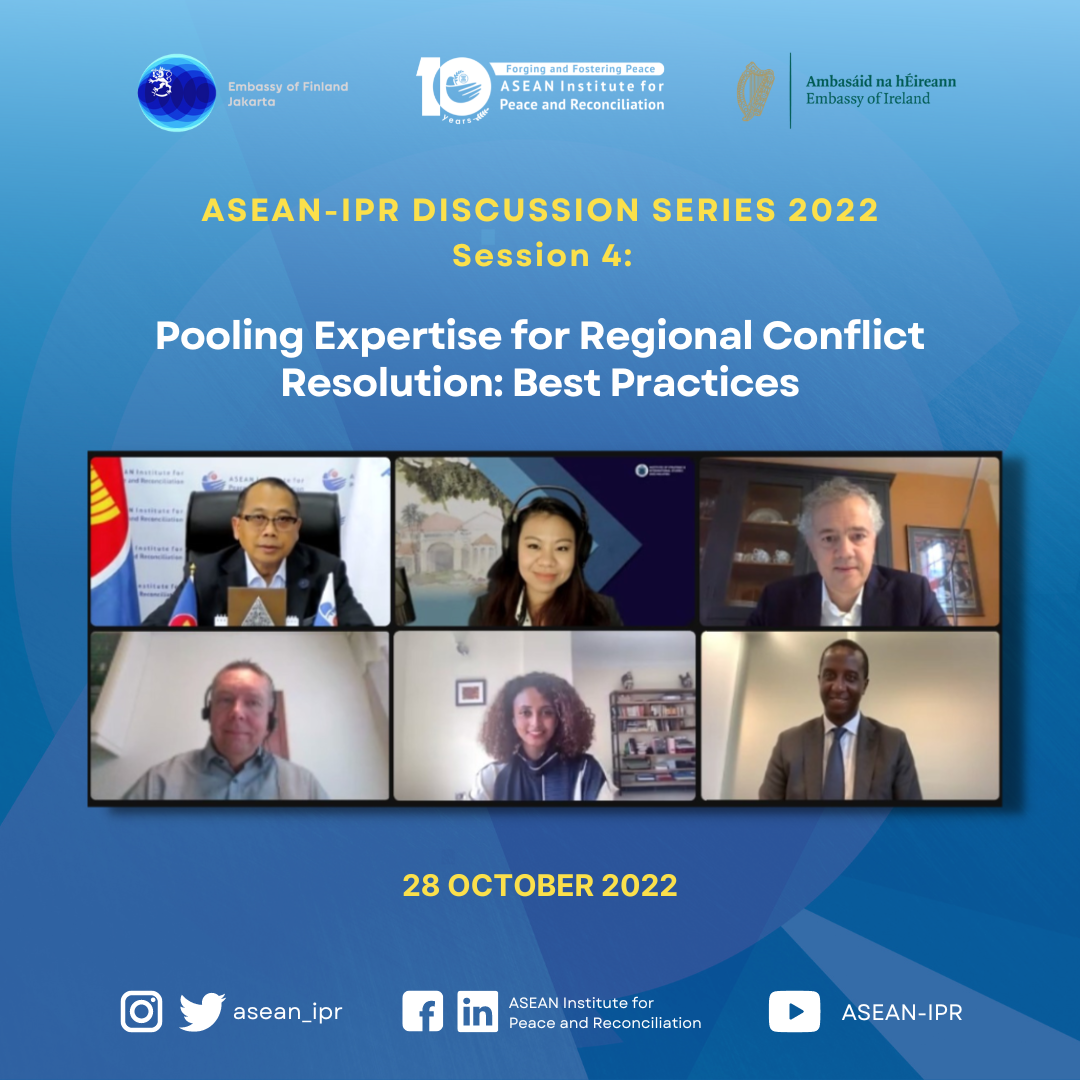ASEAN-IPR Discussion Series 2022 Session 4: “Pooling Expertise for Regional Conflict Resolution: Best Practices”
ASEAN-IPR DISCUSSION SERIES 2022
Session 4: "Pooling Expertise for Regional Conflict Resolution: Best Practices"
Friday, 28 October 2022
Over 70 participants attended the fourth session of the ASEAN Institute for Peace and Reconciliation (ASEAN-IPR) Discussion Series 2022, with the theme "Pooling Expertise for Regional Conflict Resolution: Best Practices" that was conducted on 28 October 2022 through virtual webinar platform and live-streamed on the Institute's YouTube Channel. This year's Discussion Series is organised in conjunction with the Institute's 10th Anniversary commemoration. This Session explored how the proliferation of conflict around the world has prompted the regionalisation of conflict resolution. Within this trend, regional organisations and actors hold an important role as they may step in and mediate the conflict, particularly if the conflict continues to escalate and resolution or de-escalation at the national level seems improbable to achieve which might bring potential threat to regional stability.
This session was moderated by Ms. Izzah Khairina Ibrahim (Analyst, ISIS Malaysia Foreign Policy and Security Studies). Four prominent speakers from outside the region were invited as resource persons, namely: Dr. Olli Ruohom�ki (Senior Advisor, Ministry for Foreign Affairs of Finland), Mr. Patrick de Vries (Conflict Mediation Advisor), Mr. Itonde A. Kakoma (Head of Delegation and Permanent Representative to the African Union & International Organisations, IFRC), and Ms. Netsanet Alemu (African Union Policy Officer). Each speaker shared their knowledge and highlighted different approaches and mechanisms in mitigating, managing, and resolving conflict at the national, regional, and global levels based on their respective experiences working on conflict resolution at the regional and global levels.
The discussion started by exploring the latest patterns and emergence of new phenomena in conflict transformation and resolution. Due to growing complexity of present days conflict, the relevance of multi-track diplomacy in peacebuilding and conflict mediation has undoubtedly increased. More actors from Track 2 and Track 3 are actively taking part which displays the capability and importance of actors outside of the usual Track diplomacy. In addition to this, the discussion also looked at the potential advantage in employing Artificial Intelligence (AI) to create an effective early warning system that could be supported by facts and real time data. The first part of the discussion was concluded with some suggestions on possible ways forward for mediation practitioners in strategizing their approach in order to adapt to the new reality of conflict. These are (1) reconsidering norms that may be outdated, (2) collaborating and seeking support from emerging new actors on conflict resolution, and (3) taking account the often-overlooked role/contribution of actors from the business/private sector.
The discussion also benefited from the insights given by the Speakers' on developing a panel of regional experts to provide advisory roles on conflict prevention or resolution. Some foundational elements to establish such a panel of experts were taken into account which include values, cooperation, preparation, and trust. One of the presentations highlighted the African Union's mechanism and lessons learned on the development of the Panel of the Wise. The AU's Panel of the Wise consisted of Pan-African, Network of the Wise, the FemWise-Africa, and the Wise-Youth which demonstrates the cross-sectoral collaboration between Track 1 and Track 2 actors.
Ultimately, the discussion emphasised three major points to keep in mind to better address current regional and global challenges, which are: (1) Early warning mechanism that can provide information on potential conflict in a timely manner, (2) Enhance linkages with national and sub-regional actors/organisations to create a multi-stakeholder bottom-up approach that is inclusive and incorporates all layers of society, (3) Ensure cooperation, complementarity and avoid duplication by working closely with sub-regional organisations.
If you missed this session, head on to the ASEAN-IPR's YouTube channel to see the whole session's recording. Be sure to subscribe to our YouTube channel, check out our website, and follow our social media for the latest information and/or updates on our activities. Stay tuned for the last session of the ASEAN-IPR Discussion Series 202
*******




